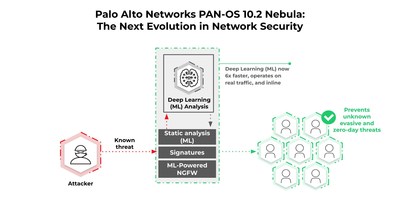- Broadcom grows revenues by 20% following VMware purchase, as customers fume about subscription costs
- How global threat actors are weaponizing AI now, according to OpenAI
- The viral Air Purifier Table is my smart home's MVP (and it's on sale for $179)
- Grab the Galaxy S25 Edge for $170 off and get a free Amazon gift card - but act fast
- How I learned to stop worrying and love my health tracker
Palo Alto Networks Introduces PAN-OS 10.2 Nebula: The Industry’s First Inline Deep Learning Protection for Network Security to Help Stop Sophisticated Attacks as They Happen

Latest upgrade of industry-leading PAN-OS software leverages cloud compute to detect highly evasive threats more quickly and effectively than anything previously available
SANTA CLARA, Calif., Feb. 9, 2022 /PRNewswire/ — Palo Alto Networks (NASDAQ: PANW), a 10-time leader in network firewalls, today announced Nebula, the latest upgrade of its industry-leading PAN-OS software, to help find the evasive, zero-day attacks that can cripple organizations — and stop them in their tracks.
PAN-OS
®
10.2 Nebula
collects, analyzes and interprets potential zero-day threats in real time using inline deep learning — a network security first. This results in six times faster prevention and 48% more evasive threats detected, surpassing anything previously available. Nebula also introduces AIOps — Palo Alto Networks tenth security service — and the new Advanced Threat Prevention service while enhancing Advanced URL Filtering, DNS Security, IoT Security and other related security services.
“In the past, nation-state-led cyberattacks were considered the rarest and most advanced. But today, attackers of all kinds have an advanced arsenal at their fingertips; every organization must now assume they will be the target of a nation-state-level attack,” said Lee Klarich, chief product officer, Palo Alto Networks. “Modern network security requires a fundamentally new approach. Today, Palo Alto Networks has brought that new approach to our ML-Powered Next-Generation Firewalls by harnessing the processing power of the cloud to enable deep learning inline. We believe that is how all network security will be done in the future.”
Security services that are being added and enhanced include:
- Advanced Threat Prevention: A new best-in-class intrusion prevention system (IPS), which brings security analysis from “offline” to “inline” using cloud compute for AI and deep learning techniques — without sacrificing performance. Advanced Threat Prevention can detect many unknown and targeted command and control (C2) attacks as well as evasive attacks from tools such as Cobalt Strike.
- AIOps: The new AIOps uses machine learning to predict up to 51% of disruptions to NGFWs before they impact the firewalls.* In addition, with telemetry from over 6,000 deployments, AIOps continuously recommends best practices to improve overall security posture.
- DNS Security: Now extends protection for the latest DNS-based attack techniques, including strategically aged domains, making it the most comprehensive DNS security solution available with 40% more DNS-based threat coverage than other leading vendors.
- Advanced URL Filtering: Adds prevention of new, highly evasive phishing attacks, ransomware and other web-based attacks through deep learning-powered analysis of web traffic — now including live web content — in real time and inline.
- IoT Security 2.0: Simplifies IoT device visibility and automates policy creation across seen and unseen devices by using machine learning.
“Security approaches are too often reliant on an initial victim being exploited. Yet, with attackers as agile and efficient as they are today, organizations require real-time prevention to protect their environments,” said John Grady, senior analyst at the Enterprise Strategy Group (ESG). “Palo Alto Networks recognizes these issues and is expanding its machine learning capabilities by placing Deep Learning detection inline to prevent attacks before they ever impact victim one.”
“Palo Alto Networks’ industry-leading machine learning-based platform applies techniques that help customers handle sophisticated threats and meet end-to-end demands across network, endpoint, and cloud security. The company enables enterprises to go beyond standard threat protection by building a strong security posture and resilience,” said Rajarshi Dhar, industry analyst, Frost & Sullivan.
Availability
We expect that all currently shipping firewalls will be able to upgrade to Nebula starting in March. Some features require subscriptions to specific security services.
More Information
More information about PAN-OS 10.2 Nebula is available here, or join the virtual launch event starting on March 22 to learn more.
About Palo Alto Networks
Palo Alto Networks, the global cybersecurity leader, is shaping the cloud-centric future with technology that is transforming the way people and organizations operate. Our mission is to be the cybersecurity partner of choice, protecting our digital way of life. We help address the world’s greatest security challenges with continuous innovation that seizes the latest breakthroughs in artificial intelligence, analytics, automation, and orchestration. By delivering an integrated platform and empowering a growing ecosystem of partners, we are at the forefront of protecting tens of thousands of organizations across clouds, networks, and mobile devices. Our vision is a world where each day is safer and more secure than the one before. For more information, visit www.paloaltonetworks.com.
Palo Alto Networks, PAN-OS, and the Palo Alto Networks logo are registered trademarks of Palo Alto Networks, Inc. in the United States and in jurisdictions throughout the world. All other trademarks, trade names, or service marks used or mentioned herein belong to their respective owners.
*Based on a support cases analysis of a focused customer
![]() View original content to download multimedia:https://www.prnewswire.com/news-releases/palo-alto-networks-introduces-pan-os-10-2-nebula-the-industrys-first-inline-deep-learning-protection-for-network-security-to-help-stop-sophisticated-attacks-as-they-happen-301478371.html
View original content to download multimedia:https://www.prnewswire.com/news-releases/palo-alto-networks-introduces-pan-os-10-2-nebula-the-industrys-first-inline-deep-learning-protection-for-network-security-to-help-stop-sophisticated-attacks-as-they-happen-301478371.html
SOURCE Palo Alto Networks, Inc.


